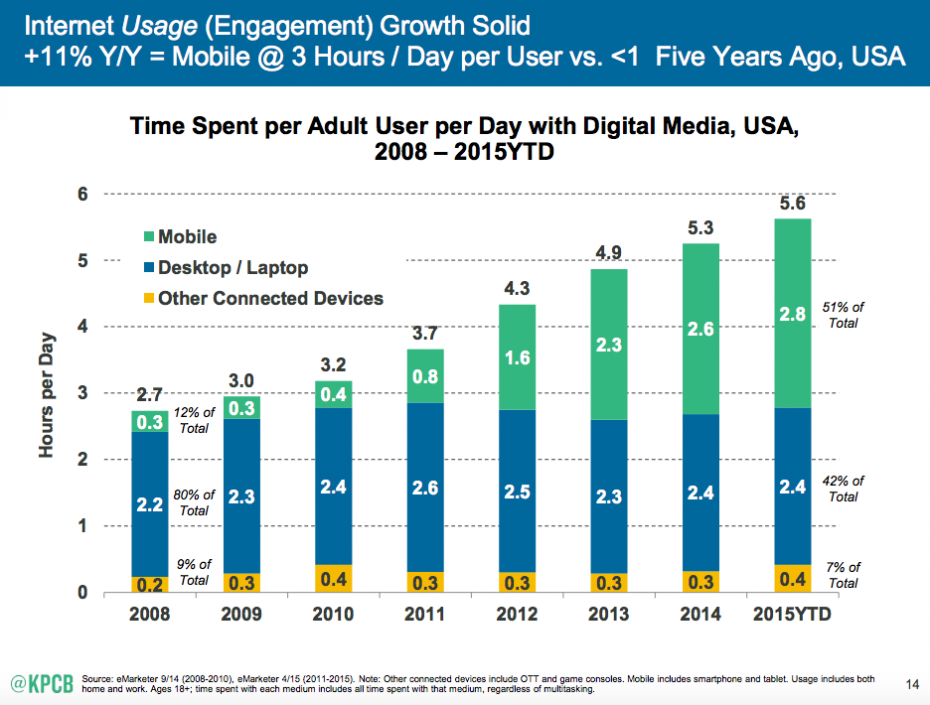Keeping up with customers online and across digital channels is no easy task.
As online channels continue to represent an increasingly important avenue for business in every sector, a key question often asked is: how do I guarantee success online in the future?
One way to answer that questions is building an app.
Here’s why:
Why Apps Are Important
First, consumer behaviour. People are spending more and more time on their phones, up to
2.8 hours per day the US in 2015.
Furthermore, of that time, people are spending the vast majority of it in apps – 80% in 2013 and then up again to 85% in 2015.

So, if the goal of your communications is to be where your customers are, the data is showing that's in-app.
Second, apps are growing in importance because of trends we’re seeing in the digital landscape right now. The transition in 2015 was to shift apps to be very much single-function, with app developers “unbundling” ancillary functions from the core app.
The most notable example of this is Facebook Messenger, which was split out from the primary Facebook product as its own app.

Apps are not just downloadable versions of your website, but offer businesses a chance to focus on where they add value to their customers, and provide them that service in the most accessible way. While one app may not do everything, it can provide a superior experience for users over a website.
Which brings us to user experience (UX). Even with responsive design and mobile sites, apps have the ability to provide a better, faster, and cleaner mobile experience.
While they are more work to maintain than a responsive site, the biggest advantage from a UX perspective is an app's ability to function in part without an internet connection.
For example, Instagram will let users take, edit, and caption a photo – all offline – and when the user re-connects, the draft photo is automatically posted.
Users have come to expect a seamless experience, regardless of whether they’re online or not.
Apps are currently in-demand – they provide a better experience for the user, and users know it.
As we saw earlier, these benefits are attracting people towards engaging with apps more often, which can provide a significant opportunity to improve your company’s digital presence.
The Benefits of Apps Over Websites
We touched briefly on this earlier but lets look at a few key areas where apps out-perform websites.
First, mobile apps create a better mobile experience because they are built specifically for a mobile device, and can be tailored both in what they do as well as how they do it.
Take a mobile banking app, for example. The needs of a user who is out-and-about are likely to be different from the user who is sitting at a desktop on the full website.

Second, apps can be used for marketing far more effectively than websites. They can act as a direct marketing channel with push notifications, they can provide awareness marketing by being visible on your customers’ screens all the time, they can be used to promote loyalty messaging, they can be used as a key tool in social strategy – the list goes on.
For a small company, the investment in an app can be quickly recovered by the efficiencies gained on marketing alone.
Sure, a lot of these benefits are applicable to websites too and this is where companies need to choose what marketing strategy they want to pursue.
Generally a website will have a broader reach with PPC and SEO, but a far less qualified visitor.
Apps are the inverse – it takes effort to download an app, so once someone does you can infer they’re probably more invested to use it.
So, it depends on what type of business you have, and what you want your marketing to do for you.
Looking Forward

Due to overarching trends in our culture and daily lives, we believe apps will remain a growing part of what’s next.
With mobile’s inevitable dominance, especially as smartphones and tablets become the primary devices for the generation of up-and-coming young professionals, we think that personalization and effective data use, will drive engagement, customer loyalty, and brand value.
We advocate apps to complement websites, and feel that regardless of size, companies should be thinking about apps as core to their mobile strategy.
Apps provide a better mobile experience, better marketing opportunities, and are much more inline with existing customer trends.
You’re only as good as your tools – and an app is an essential tool to help future-proof your digital presence.
